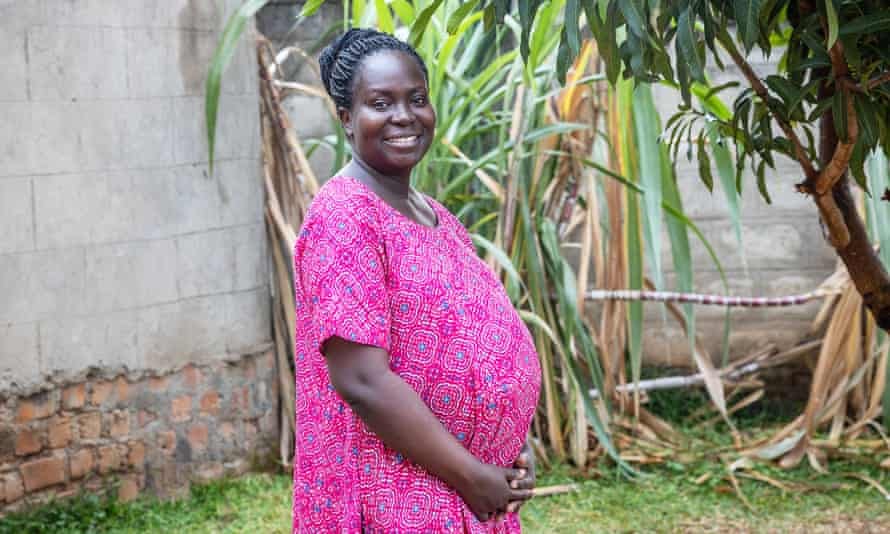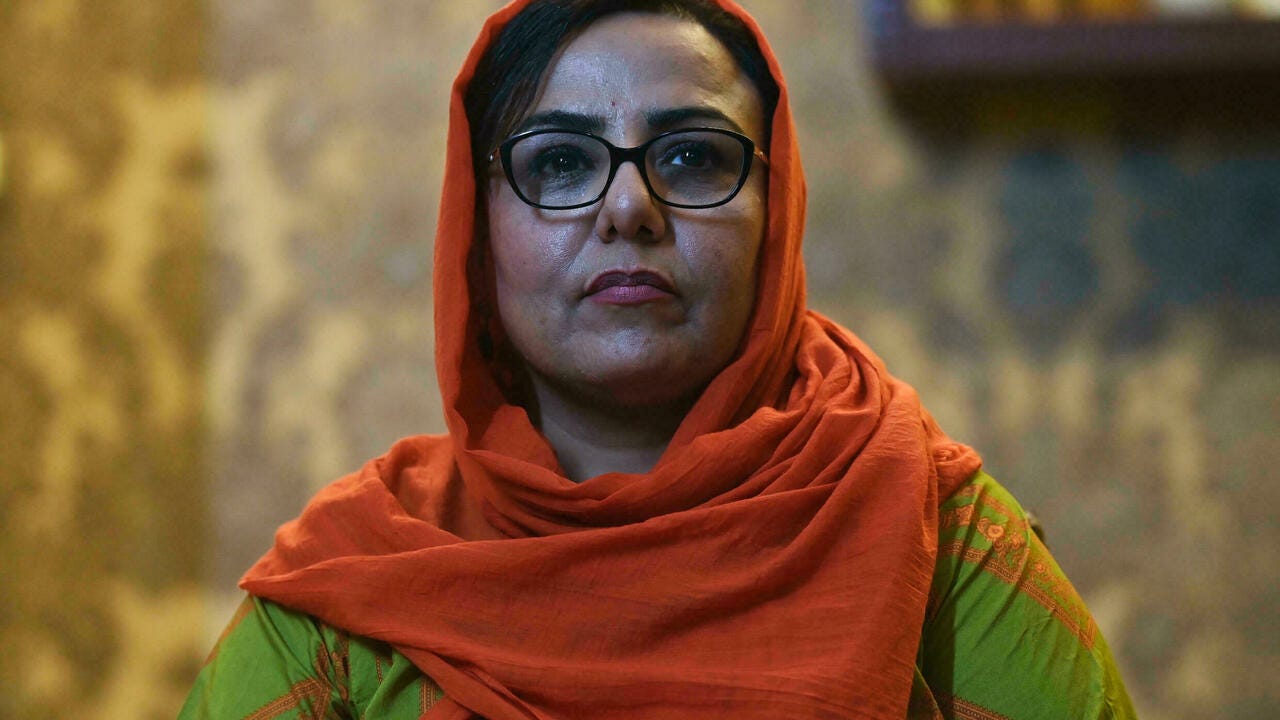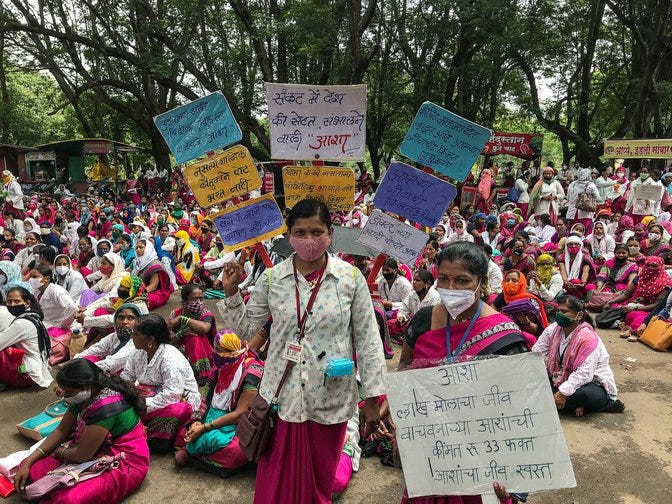Global Roundup: Women vs Sexual Violence in South Sudan, Survivors in Afghanistan, Spain Protests vs Homophobia, Women Healthcare Workers in India Demand Better Conditions, Black Woman on #FreeBritney
Compiled by Samiha Hossain
Gloria Soma, photographed in Kampala, Uganda, is director of the Titi Foundation in Juba, South Sudan, which focuses on women and children. Photograph: Sofi Lundin/The Guardian
Gloria Soma is the director of the Titi Foundation, an NGO focused on women and children in South Sudan – a country whose first decade of independence has been plagued by civil war as well as rampant sexual violence and poverty. Over 70% of the staff at Titi are women – a strategy Soma believes should be replicated across society and at the highest echelons of political leadership.
Women in South Sudan, for a very long time, have been marginalised and thought to be second-class citizens who cannot deliver. It leaves out ideas for innovations that women would have brought to the table if given the opportunity. - Gloria Soma
Soma was inspired to start the organization in 2016 when fighting between troops loyal to Salva Kiir, the former rebel leader turned politician who was sworn in as president, and soldiers who supported Vice President Riek Machar, exploded on to the streets of Juba. She provided shelter from the violence to hundreds of women and children in her family’s compound. This led her to hear stories of trauma from these women including stories of rape, murder, abduction and forced displacement on a massive scale.
One of my greatest fears living in South Sudan is that you mentally have to prepare your head that any moment, any time, anything could go wrong. I don’t feel safe … There’s always that sense of fear. – Gloria Soma
Titi tackles a wide range of intersecting issues such as food insecurity and child nutrition, as well as more ambitious projects to reduce gender-based violence and boost female employment. Throughout the pandemic, they have been helping women maintain hygiene.
Soma believes that part of moving towards peace requires the country embarking on a process of healing and confronting the trauma people have. She says that they need a sort of “safe hub” where survivors can openly have conversations. Her foundation is currently working on pushing for more prosecutions of those accused of abuses against women and girls. Despite all the barriers, Soma remains optimistic and hopeful for a better future for South Sudan, but only if it is committed to healing.
——————————————————
As the Taliban seizes large swathes of the country, Mary Akrami fears for the safety of the women at her shelters for survivors of domestic violence ADEK BERRY AFP
Mary Akrami is a woman in Afghanistan who is the founder of a shelter and restaurant where survivors of domestic violence live and work. She fears that her work will be lost with the departure of foreign forces who had pledged to restore women’s rights. As US and international troops have left the country, the Taliban has seized control, leaving Afghan forces in crisis.
Akrami, who is also director of the Afghan Women's Network, fears for the safety of the women at her shelters. One site has already closed because of clashes in the provinces.
A woman who is running away from home has no place to go…We received cases of women tortured, sexually abused, physically abused. - Mary Akrami
The United Nations estimates that the vast majority of women in Afghanistan have experienced physical, sexual or psychological violence, and women who leave their husbands face hostility and stigma from society. Over 20,000 women have passed through Akrami's network of more than two dozen shelters since 2002.
Akrami opened the restaurant for women who have no opportunity to leave the shelter. Male customers are only welcome if escorted by women, flipping the conservative tradition where women have to be chaperoned to leave the house.
The failure of the United States to make any demands over women’s rights in the landmark withdrawal deal with the Taliban last year has left Akrami feeling betrayed. High-profile women including media workers, judges and activists are among more than 180 people who have been assassinated since September, killings the US and Afghan government blame on the militants. Many activists do not have the privilege of fleeing the country as the situation escalates.
Being a woman in Afghanistan is not easy…I'm tired of fighting continuously and I'm on the verge of losing everything. - Mary Akrami
Despite who is in power or who is in conflict, women continue to face horrific levels of sexual violence and policing of their freedom as a consequence. Women like Akrami continue to vocalize their struggles and challenge the patriarchy.
--———————————————————
DEMONSTRATORS IN MADRID'S PUERTA DEL SOL. PHOTO: GUILLERMO GUTIERREZ CARRASCAL/SOPA IMAGES/LIGHTROCKET VIA GETTY IMAGES
Samuel Luiz was on the streets with his friends making a call when he got into an argument with passers-by who accused him of filming them. Luiz said he was on a video call, but he was attacked by one of the passers-by who left and returned with 12 others who beat Luiz until he was unconscious. He died in the hospital shortly after. A witness says that one of the attackers shouted homophobic slurs.
Protesters across A Coruña, Madrid, Barcelona, Valencia, Salamanca, Bilbao, Zaragoza and other cities demanded justice for Luiz and protection for LGBTQ+ people from violence.
I've changed the way I dress and wear make-up. I'm less suggestive, less flamboyant. I'm more scared to face certain situations. And it's not because I'm not brave enough - I can take that and much more, honey. But look at what happened to Samuel. - Alejandra Aguado
There have been a several high-profile homophobic events in European countries recently including anti-LGBTQ laws in Hungary that restrict teaching LGBTQ values in schools as well as violent counter-protests Pride Marches in Croatia and Georgia. In addition, government data shows 278 sexual orientation or gender identity related hate crimes in Spain in 2019, which is an 8.6% increase since 2018.
Many of the attacks we're seeing now are in groups and in this case they're more violent…Citizens end up feeling scot-free and committing attacks in broad daylight and even in front of witnesses. - Marc Serra, a councillor in Barcelona
--—————————————————————————
ASHA workers protesting over pay in Kolhapur, Maharashtra, June 2021. Majority World CIC / Alamy Stock Photo. All rights reserved
All ASHA workers are women, and they work on the ground with rural and often marginalized communities. Their tasks include stocking medicine, treating minor ailments, providing advice on contraception and pregnancy, and facilitating access to medical centres. They also increase healthcare awareness and are the most trusted medical figures in many communities.
Most of the people in my village love and respect us. They often say that they will do whatever ASHA didi [auntie] tells them to do, because they trust us to that extent. We get more respect than the doctors who work in our village. - Aruna Sarkar, an ASHA worker with a focus on maternity care, based in Raipur village in West Bengal
Despite the crucial role they play in healthcare, the government has been showing a pattern of devaluing them. For instance, many were not provided with personal protective equipment (PPE) kits by the government. In addition, they are treated like volunteers as they do not have permanent status and receive few or no benefits.
At least 44 ASHA workers have died from COVID-19, but the real number could be far higher. The families of the employees who died as a result of COVID-19 have yet to be compensated according to colleagues.
Around 600,000 ASHAs went on strike last year and 70,000 ASHA workers in Mumbai called off a strike after they were promised a pay rise in June of this year. Despite their unfair treatment by the government, the ASHA workers are concerned about the impact of their strike on the communities they serve.
I have discussed with my fellow ASHA workers about organising a protest, but the more disadvantaged among us are too scared to do anything in case they lose their job. - Aruna Sarkar
Women’s labour has a long history of being underpaid and devalued, despite it being the backbone of society. Activists in India and around the world should stand in solidarity with these healthcare workers and put pressure on the government to meet their demands.
————————————————————————————
PHOTO: RICH FURY/GETTY IMAGES.
#FreeBritney has been gaining traction on social media, as troubling details of Britney Spears’ conservatorship have surfaced online. Spears gave a public testimony in June where she says her conservatorship is so tightly managed by her father, that she has been unable to publicly disclose the abuse she has endured. At one point, she asks the judge to allow her to remove her IUD so that she could begin trying to grow her family.
Jones discusses how although she does not necessarily listen to Spears’ music, the impact that her own gender and neurodivergence has had on the medical treatment she receives, makes her identify with Spears. She argues that conservatorships and eugenicists use the same language of preventing suffering for those who cannot function in society to control women’s bodily autonomy. This narrative disproportionately affects marginalized people such as Black and Indigenous women.
Jones was not forced to get an IUD but was motivated by the fear that the Trump administration and conservative government would make it difficult to access monthly birth control, especially on a student budget. It was a physically painful process for her, but she talked herself out of her own pain for over a year, “with the help of nurses and doctors who were already skeptical of my capacity for pain, my concern for my own physical health, and my intellectual ability to understand medical communications.” Ultimately, Jones made the decision to get the IUD out once it became unbearable.
Jamie Spears and the conservatorship over Britney Spears rely on an entire system designed to support the involuntary sterilization of people the state consigns to an unfit underclass. - Leslie Kay Jones.
#FreeBritney is an important movement to create pressure for the singer to see justice and gain autonomy over her life. It is also important for the movement to reckon with the intersections of patriarchy, misogyny, white supremacy, and ableism among other systems of oppression which create and sustain the conditions for something like this to occur to Spears and other women in the US and around the world.
——————————————————
Samiha Hossain (she/her) is a student at the University of Ottawa. She has experience working with survivors of sexual violence in her community, as well as conducting research on gender-based violence. A lot of her time is spent learning about and critically engaging with intersectional feminism, transformative justice and disability justice.
Samiha firmly believes in the power of connecting with people and listening to their stories to create solidarity and heal as a community. She refuses to let anyone thwart her imagination when it comes to envisioning a radically different future full of care webs, nurturance and collective liberation.






